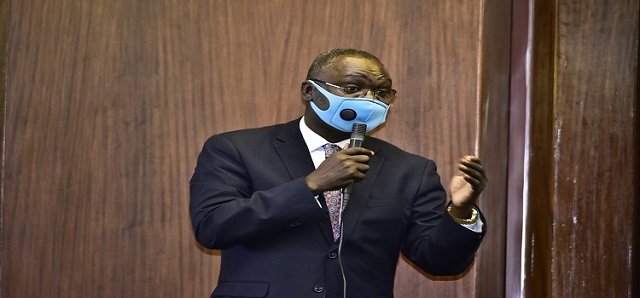
Kampala, Uganda | THE INDEPENDENT | Lawmakers have adopted a report by the Parliamentary Task Force on the National Covid-19 Response calling on the Auditor General to carry out a forensic audit into all Covid-19 expenditures to ascertain value for money.
In its report to Parliament on 03 August 2021, the Task Force recommended a forensic audit into the Shs4 trillion that was meant to fight the Covid-19 pandemic since its onset in March 2020. Out of this, Shs314 billion was allocated in fiscal year 2019/2020, Shs2.7 trillion in 2020/2021 and Shs932 billion for 2021/22.
The Deputy Speaker Anita Among while chairing a plenary sitting on 01 September 2021, directed that the Auditor General reports to the House in two months.
“The Auditor General should also carry out an audit on funds given as donations towards the fight against the Covid-19 pandemic,” she said.
Among added that the Committee on Health should do a follow up on the recommendations made both by the Parliamentary Task Force and the Ministry of Health’s response to the report.
“The Ministry of Health should constantly update Parliament on the status of government response to the Covid-19 pandemic,” Among said.
The recommendations followed a response by the Minister for Health, Jane Ruth Aceng to the report of the Parliamentary Task Force.
Aceng said that whilst the Task Force requested government to submit detailed accountability to Parliament of Shs22 billion appropriated to facilitate establishment of 20 isolation centres per district, the Ministry re-purposed mental health units into treatment centres in the 15 regional referral hospitals at that time.
She added that the Ministry spent shs90 billion to procure 37 million masks.
Aceng however revealed that there was a shortfall of one million masks due to additional masks distributed to districts caused by discrepancies in the projected population figures from Uganda Bureau of Statistics.
The Minister also clarified on an observation indicating a likelihood that funds from partners and those from government could have been used to fund same activities.
“The Covid-19 response plans were developed and implemented jointly with partners, hence no room for duplication. Support from partners is largely in-kind/off budget support. Therefore, it is not true that the Ministry of Health applied the partner’s resources and those from government to fund same items and activities,” she said.
On the committee’s observation that all regional referral hospitals were in dire need of both ICU space and functional assorted equipment, Aceng said government has provided a budget for procurement of oxygen plants and maintenance of existing plants at the regional and national referral hospitals.
“Ministry of health will procure 18 pressure swing adsorption plants for 15 regional referral hospitals, Bombo Military Hospital and two to be installed at Wabigalo to supply Mulago, Kawempe, Naguru and Kiruddu National Referral Hospitals,” she said.
The Chairperson of the Task Force, Abdu Katuntu asked the Minister to act on the recommendations of the committee saying that these will go a long way in improving the health sector.
“There is no need for you to be defensive. With this pandemic, schools and businesses were closed and yet we cannot say that the pandemic is over. If you took our recommendations in good faith, it is for the good of the country,” he said.
Katuntu added that discrepancies in expenditures can only be solved by a forensic audit, saying that no blame was apportioned.
“We did point out that we have so far spent close to Shs4.3 trillion in 15 months, this is the first time this is happening. If we have spent that money, we pointed out that there was a discrepancy of about Shs 4.8 billion,” he said.
He also pointed out that whilst the minister’s response shows that there is no shortage of Intensive Care Unit (ICU) centres, the facts on the ground are different.
“Many ICUs are not functional. This is because there are no staff and specialists, some have no equipment and working as High Dependency Units. We have already spent close to Shs38 billion on ICUs and they are not operational,” he noted.
He added that in Northern Ugandan, there is only one facility with a CT scan.
David Lagen (NRM, Agago County), backed up Katuntu, saying that patients in Northern Uganda travel as far as Mbale or Kampala in search for CT scan services.
“There is a need for the ministry to set up five CT scans in Northern Uganda. It is a shame to hear that ICUs are redundant because of lack of equipment and staff,” he said.
Donald Kataliwha (NRM, Mwenge County South), cited Rwenzori region, where he said does not have a CT scan.
“I recommend that the ministry carries out a deliberate comprehensive emergency plan for the health sector,” he said.
Patience Kinshaba Nkunda (NRM, Kanungu district), highlighted the plight of people in Kanungu, saying the only existing health centre IV operates with one generator which is unreliable.
“We have only 31 small oxygen cylinders; most of the time we have to use concentrators. We appeal to government to procure for us equipment,” she appealed.
The Task Force was constituted by the Deputy Speaker, comprising regional teams to the Northern, Eastern, Western and Central parts of the country.
The Task Force which commenced work on 29 June 2021, was to among others inquire into and report on government’s preparedness and response to Covid-19 and to provide assessment of health impact of Covid-19 in the community and the country at large.
*****
SOURCE: UGANDA PARLIAMENT MEDIA
 The Independent Uganda: You get the Truth we Pay the Price
The Independent Uganda: You get the Truth we Pay the Price



